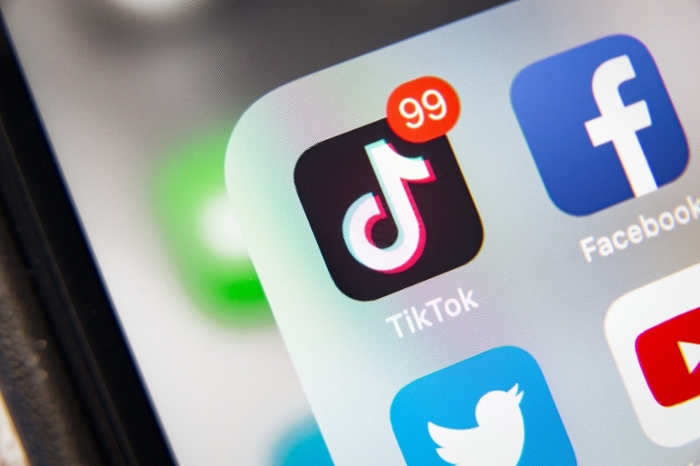TikTok. It has acquired 800 million users since it launched in 2018 and is the most downloaded app in Apple's App Store, surpassing YouTube, Instagram, WhatsApp, and Facebook Messenger (Oberlon.com, 2020).
The short-form mobile video app has caught fire with Gen Z but there’s another audience that’s smoldering over it. In August, President Trump signed an Executive Order banning it from the U.S., but a district judge blocked it when TikTok challenged the order, citing lack of proof and due process. However, on October 24, lawyers for the Trump administration filed papers stating that the administration has a right to ban the app by November unless certain restrictions are put into place this month, namely, that TikTok finds an American buyer.
Why TikTok is in the News
The company that owns TikTok, ByteDance is based in China and President Trump wants the app banned out of what he sees as potential threats to national security. The president has declared that the company has ties to the Chinese Communist Party and they’re accessing the personal data of U.S citizens.
Social media platforms and apps connected to platforms accessing personal data is an on-going major concern. “Concerns about data flows through companies and to governments are on the rise. Although TikTok has asserted its U.S. operation is not under Chinese jurisdiction and that all the data is stored in the U.S., the problems may be more acute, because its parent company is based in China,” said Deven Desai, Associate Professor and Area Coordinator for Law and Ethics at Georgia Tech’s Scheller College of Business.
While ByteDance has denied the allegations, the Chinese government can require companies to turn over information and that has officials nervous. Currently, there are talks that Microsoft and Oracle are the likely buyers of the app for U.S. consumption, but Walmart’s name has been included in those who want a majority stake if the company sells to the U.S.
An App for Gen Zs – For Now
For now, TikTok continues to be downloaded by millions of people each month. What makes this app so irresistible despite potential privacy issues? According to Tim Halloran, Senior Lecturer in Marketing at Scheller College, TIkTok “has tapped into a relevant consumer need by Gen Z for a social media app that they feel is specifically designed for them. It taps into their love of music and dance and also has become their own social media app away from those ‘older people’ on Instagram and Facebook,” he said.
The question remains - how long will this last? As with SnapChat, once it had established its user base, older “Millennials” created accounts and SnapChat slowly began to lose its original users. TikTok is still young, so the next year may show older users signing up, leaving the younger generation in search of another platform to call their own.
Consumer Consumption and Commercialization
Like its predecessors, Vine and Musical.ly, TikTok features dancing, singing, lip-syncing, and funny videos delivered in bite-sized pieces. It’s the perfect distraction for short attention spans. “TikTok has those elements that are essential to social media success – it drives engagement by tapping creativity and sharing one’s ‘message.’ As a result, teens and young adults engage creatively with their existing network and grow new networks through performance,” Halloran explained.
And performances can garner profits. Like many social media apps, TikTok creates influencers. And these influencers can become celebrities depending on their number of followers and high engagement with users. This brings in sponsors who pay influencers to display their products or use their music. For example, one influencer currently has accumulated a net worth of $4M from just TikTok videos alone. Halloran is not surprised that the app has become more commercialized. Companies are paying attention to opportunities to reach Gen Z audiences through product placement. They also realize that their brand messages must be short and subtle to encourage users to interact with them in a more direct, personal way.
The Politicization of TikTok
Despite its seemingly innocent content (although some strong language is used in some videos), the app is facing a relatively new movement: politicization. According to Halloran, “Any social media app clearly has the potential to be abused by ‘bad apples’ who want to leverage it for less than virtuous purposes.” He continued, “However, if the app is really interested in maintaining that strong relationship with its consumer base, it will do right by them – in other words, the best social media platforms should work diligently to block ‘fake news’ as it will ultimately negatively impact their relationship with their user base.”
The app is already a platform for politicization by its users. For example, in one well-known case, users reduced attendance at a Trump rally by encouraging individuals to purchase tickets it had no interest in using, thereby denying access for Trump supporters to attend. What’s more, users are setting up conservative, liberal, and bipartisan groups, or “hype houses,” to express their opinions, create mini political ads, and campaign for specific politicians, including presidential candidates. Halloran says that TikTok’s success will also depend on how well it moderates content and acts quickly to address hate speech and inaccurate news.
Privacy Concerns
Regardless of whether TikTok is truly not under Chinese jurisdiction or sold to a U.S. company, TikTok raises privacy issues. For example, it’s still to be determined if political organizations will be able to get their hands on user data, but from experience with other social media apps, U.S. data is being collected, whether users know it or not. When a user creates an account, ByteDance knows what phone a user has, their social network contacts, GPS position, and personal information such as age and phone number along with any content posted, such as photos and videos. It can also store payment information. How much should U.S. citizens, including parents of Gen Z users, be concerned about data privacy?
A lawsuit against the company was filed in August by some parents of young TikTok users stating that personal data is being collected including biometrics, also known as facial recognition technology. ByteDance is fighting the lawsuit, claiming it has a right to collect and share user data with corporate affiliates, business partners, and service providers, stating it is standard protocol for all social networking companies. “Facial recognition technology is used by Apple, Samsung, LG, and Motorola, and can enable contactless transactions, which are in demand because of the Covid-19 pandemic," said Desai. “The recent use of such technology by police in Michigan led to a false arrest, showing that better accuracy, due process protection, limits on how long data is kept, and other safeguards are needed. For example, the data needs excellent cybersecurity against hackers and other possible ways the data could be leaked or misused,” Desai said.
Desai also points out that beyond TikTok there will likely be other Chinese apps and technology that could store data in China and be under Chinese law which is in the process of changing to address data protection. “The questions are what will the final law be and how will China follow through on enforcing it. In other words, regardless of where a company is headquartered, society needs real protections against a government’s ability to grab an individual’s data from a company’s data hoard,” noted Desai.
For now, ByteDance has until November to sell to a U.S. company or U.S. citizens won’t be able to download the app. However, giving ownership to the U.S. won’t prevent personal data from being collected, and it may set a precedent for government interference into a company’s right to collect data a user has agreed to share. For now, the clock is ticking.

